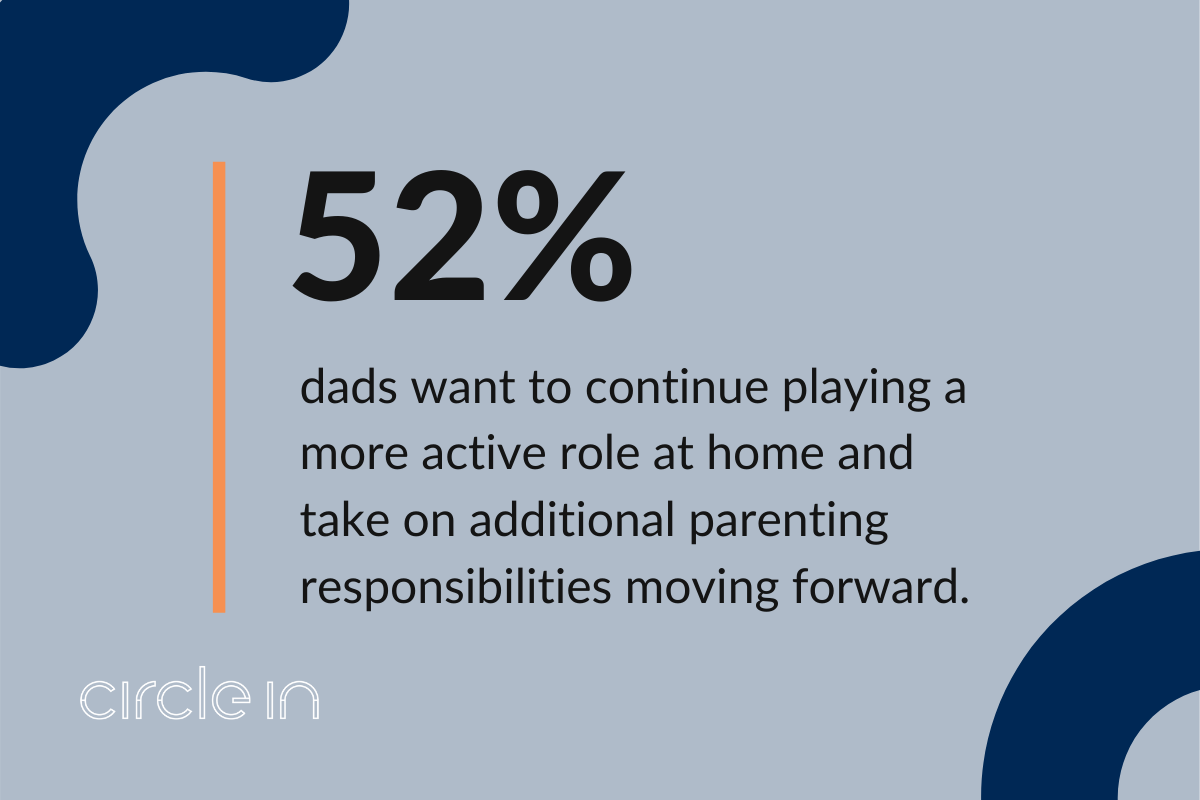With the tail end of Men’s Health Week culminating in Fathers’ Day across many parts of the world, Circle In brought together our dad-powerhouse: Rob Sturrock, Blake Woodward, Michael Ray and Phil Heys, for the Fathers’ Day Dads’ Roundtable to discuss: How COVID-19 has changed what it means to ‘dad’.
Not since the cusp of the Industrial Revolution has home and work life merged together so dramatically for men. And while life in lockdown has given dads a greater appreciation of the realities of homelife and the mental load carried by their partners, it has also lifted the curtain on the culture of hidden parenting that employers are often blind to.
Taking learnings into the new normal
What has become overwhelmingly evident is the number of employees who, having experienced flexible working during restrictions, want to continue.
Our research¹ shows that around 97% of respondents want to continue to work on a flexible arrangement as we move out of COVID-19 restrictions and into the next phase. From the many discussions on flexible working we have shared with organisations and industry stakeholders, this doesn’t come as a surprise. But interestingly, 52% of dads who responded to our survey said they wanted to continue playing a more active role in the home and take on additional parenting responsibilities moving forward.
The COVID-19 Dad Survey², conducted by Blake Woodward of Suit Tie Stroller, found that “almost 90% of working dads were able to work flexibly [during lockdown] and now want to hold onto that, and are ready to make key life-changing decisions like applying for permanent flexible work or being ready to change jobs.”
For our panelists, they want to see flexible working become part of workplace culture more broadly, and for the implementation of policy that is not only gender neutral, but tailored, empowering employees to decide what flexibility they need for their family.
“It’s hoping to really embed this idea of flexible work and to see a lot of organisations walk the talk,” says Rob Sturrock. “That’s been for my family and for me one of the best things out of the last couple of months, having a little bit more freedom and flexibility to create the workday.”
Breaking down the stigma
Twice the amount of men report their flexible working requests to be denied compared to their women counterparts. An AHRC report records that 27% of men face discrimination in the space and are perceived as “not serious about their careers” when they decide to take time off or a step back for their kids. When we speak to dads who have gone against the grain to take a step back – they report quite the opposite about their careers.
“I moved to a four-day week working part-time about three years ago and it’s the best thing that I’ve done…not just for my family life but for my career as well. It’s made me more ruthless with my time, it’s made me a better problem solver, it’s made me better with my communication and empathy of colleagues. The soft skills have been enormously beneficial for my career and I don’t regret it at all.” says Rob Sturrock, father of two.
Over the last few months, an overwhelming majority of organisations have been finding that employees can be productive and work flexibly. On the flip side, a large proportion (72%) of people say that they’re equally productive or more productive by working at home because there’s less distractions, there’s less bumping into other colleagues, or excess meetings.
There has never been a better time to bridge this gap and do away with the old way of thinking.
Next steps for dads
So, what are the next steps for dads who wish to carry some elements of this new way of working into the future?
- Set your priorities: As a first step, work out what it is that you want. Is it generally more time with the kids you’re craving? Do you want to help more in the home? Less commute time? More time for you?
- Reassess family values: Take this chance to reset and have an honest conversation with your partner about what the family needs – each member individually and as a whole. Look to divide responsibilities more equitably – not simply the practical tasks, but emotional support to your children.
- Reassess your work pattern: How can you recalibrate your work day so that you’re not just confining fatherhood to outside the 9-5?
- Talk to your employer: Once you and your family are clear on your values and needs, meet with your employer to discuss a more permanent flexible working arrangement, and set new expectations and boundaries.
Based on this overwhelming evidence, it’s fair to say that there’s no going back, and an incredible opportunity has arisen for workplaces and families to reset, address key issues, have difficult conversations and act upon their good intentions. To quote Michael Ray, solo dad, our children are not a hindrance to our careers, they’re the purpose for it.
Watch the full discussion here:
Sources:
¹ Circle In and Beam Australia Future of Work Survey 2020
² SuitTieStroller Global Dad Survey 2020







